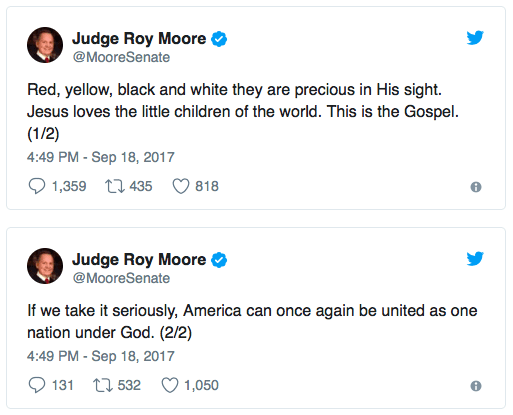For all the alienation from mainstream culture I felt when I first left evangelicalism, having grown up in an evangelical home does give me the ability to code switch. When Roy Moore said at a campaign rally in September that “we have blacks and whites fighting, reds and yellows fighting,” and then called for God to unite us, I knew where the terms he was using were coming from. Unsurprisingly, when the media reported that Moore had used racial slurs for Native Americans and Asians—and terms he used are racial slurs—Moore’s campaign responded with confusion:

“Red, yellow, black and white they are precious in His sight,” the Moore campaign tweeted. “Jesus loves the little children of the world. This is the Gospel. If we take it seriously, America can once again be united as one nation under God.” The campaign demonstrated no understanding of why people were upset, only a tone deaf insistence that using racial slurs was okay because Moore was quoting from a popular evangelical song.
I grew up singing “Jesus Loves the Little Children.” I suspect there are few evangelicals of my generation, or previous generations, who did not—and I very much suspect that the song remains popular among evangelical children’s ministries today.
Jesus loves the little children,
All the children of the world.
Red and yellow, black and white,
All are precious in His sight,
Jesus loves the little children of the world.
A knee-jerk “we’ve always done it this way” response to someone pointing out that the song includes racial slurs is inadequate and short-sighted. Whether the song has been sung that way for a hundred years is irrelevant to whether it contains racial slurs.
Evangelicals view themselves as world-centered. Many attend churches that support missionary work across the globe; as a child, my family spent time in prayer every day for peoples around the world. I learned a lot about other countries from Operation World, a thick book that included information and prayer suggestions for every country in the world. Evangelical perceptions of themselves as world-centered (and therefore not racist) undergird the response of the Moore campaign. The result is a lack of willingness to listen, or introspect.
Indeed, conservatives responded to the furor over Moore’s comments by blaming the mainstream media for being “tone-deaf.” The claim, in other words, was that if the media had known that Moore was quoting from a Bible song, they wouldn’t have jumped on him for using racial slurs. Do you see what I mean about a lack of introspection? It was evangelical defenses of Moore’s use of the slurs that was tone-deaf.
It does not matter how old the song is or where it originated. The terms “reds” and “yellows,” whatever their history, are racial slurs and should be discontinued. Evangelicals need to retire the song or revise the lyrics. And for those who might discount me for being “PC” let me ask this: Is it loving and Christlike to use terms or labels that are offensive to other racial groups? What is more important? Keeping the song, or showing love to people? Some evangelicals have recognized this and created new lyrics. Others, including the Moore campaign, remain oblivious.
The very nature of evangelicalism, or at least conservative evangelicalism, is certainty—a belief that all of the answers have already been obtained. Many white evangelicals are so certain that they are not racist that they automatically close their ears to criticism. Their inclination toward interpreting criticism from outsiders as spiritual attack makes it only more difficult for them to engage productively with critique.
The problem is deeper than one song’s lyrics. Evangelical missions work and Christian school curriculum has long been mired in stereotypes about peoples and groups that play up their “heathenness” and portray their cultures as dark and mired in sin. Again we see a problem of certainty—evangelical missionaries come into communities with the purpose of giving pre-formed answers to other cultures. They don’t come to listen, or to engage in cultural exchange. They come for something that goes one way. They come to preach, and to dispense wisdom.
White evangelicals have also failed to adequately address their own history. Many white evangelicals opposed the civil rights movement, opposed creating a national holiday in memory of Martin Luther King Jr., and even supported apartheid. By and large, white evangelicals were not among the ministers marching at Selma. And while region did play a role in this—and southern evangelicals were far more quick to oppose the civil rights movement—northern evangelicals never drew a hard line and too often participated in furthering segregation themselves.
White evangelicals need to have a serious conversation about race. This moment at Moore’s rally should have served as a wakeup call. After all, if the media hears you using racial slurs when you quote from Bible songs, you may want to reconsider what Bible songs you are quoting from. Unfortunately, however, wakeup calls only work if someone can hear them, and white evangelicals do not appear to be listening.
I have a Patreon! Please support my writing!















